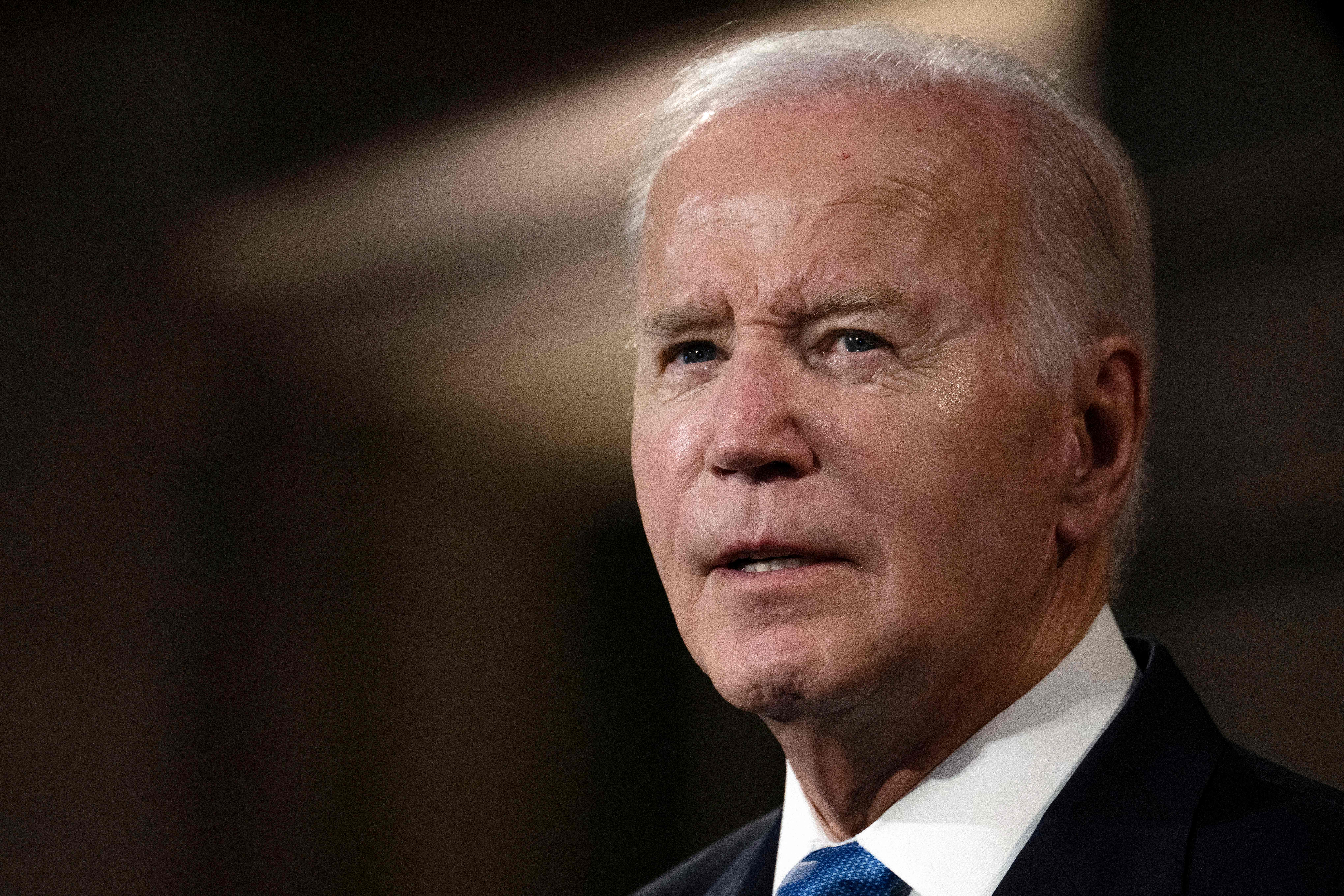With precision strikes in Syria, Biden tries to avoid lighting a powder keg
"Everything we've done — the additional forces, the messaging — is intended to prevent escalation," one U.S. official said.


U.S. airstrikes on Iran-backed militant groups in Syria on Thursday night may have felt familiar, but they come amid a far more volatile situation in the Middle East.
Back in March, Iran-backed militant groups used drones and missiles to strike a base housing U.S. troops in the Middle East. A U.S. contractor died and American troops suffered brain injuries. The U.S. responded by bombing warehouses and other logistical hubs.
This time around, the militant attacks were larger in scope, and the Israel-Hamas conflict threatens to cause more turmoil in the region. So this week’s U.S. airstrikes were carefully calibrated to keep the regional situation from getting even worse.
The operation against two facilities used by Iran’s Islamic Revolutionary Guard Corps, including an ammunition storage area, came after American forces suffered 19 drone and rocket attacks in Syria and Iraq this month. They led to the injuries of 21 service members, 19 of whom were diagnosed with traumatic brain injuries.
Defense Secretary Lloyd Austin blamed Tehran for the assaults. “These Iranian-backed attacks against U.S. forces are unacceptable and must stop,” he said in a statement on the retaliatory strikes. He asserted that the response was “separate and distinct from the ongoing conflict between Israel and Hamas” and did not constitute “a shift in our approach” to that fight.
In a letter to the House speaker released late Friday, President Joe Biden said he directed the attacks "to protect and defend our personnel, to degrade and disrupt the ongoing series of attacks against the United States and our partners, and to deter Iran and Iran-backed militia groups from conducting or supporting further attacks on United States personnel and facilities."
But three senior U.S. officials, granted anonymity to discuss sensitive internal deliberations, said that while the main goal was to ward off further Iranian-supported attacks on Americans, another was to make sure the broader Middle East conflict didn’t grow. The U.S. this month has rushed several ships, fighter planes and air defenses to the region to protect American forces and make adversaries think twice before attacking again.
“We obviously don't want to see the conflict deepen. Everything we've done — the additional forces, the messaging — is intended to prevent escalation,” one of the officials said. “We've also got troops and facilities to protect and interests to defend. We have to do both and we can do both.”
Biden and his team have repeatedly offered a one-word message to regional players who may want to exploit the Israel-Hamas conflict for their own purposes: Don’t. Iran, and the Lebanese militant group and political party Hezbollah, have been the administration’s main concern.
“My warning to the Ayatollah was that if they continue to move against those troops, we will respond, and he should be prepared,” Biden said Wednesday alongside Australian Prime Minister Anthony Albanese. “It has nothing to do with Israel.”
As the U.S. orchestrated its response to the recent flurry of strikes, planners took the broader Middle East dynamics into account. It was vital to send a strong message without offering such a massive response that it would prompt another retaliation — leading to tit-for-tat fighting that eventually could light a powder keg, said two of the officials.
“Hopefully, they will deter further attacks, but if they don't, we'll do what we need to do,” the first U.S. official said.
After the first strikes on U.S. troops on Oct. 17, the president decided to hold off on taking military action, instead dispatching top officials on a public messaging campaign designed to deter Iranian proxies from launching further attacks, according to a fourth U.S. official.
But after the news emerged that an American contractor died of a heart attack on Oct. 18 while sheltering from what turned out to be a false alarm at Al Asad air base, Iraq — even though the person’s death was not a direct result of military action — the Biden team decided that stronger action was needed, the official said.
As the reports of injuries from the attacks ticked up over the ensuing days, Biden asked the Pentagon to develop military options to respond in a proportional manner, the official said.
Ultimately, the sites in Syria, near Abu Kamal, were chosen because the U.S. doesn’t ask Damascus for permission to strike — Iraq would certainly require that — and because they were linked to Iran Islamic Revolutionary Ground Corps, Tehran’s paramilitary arm. The facilities were used by Iranian proxy groups to store munitions directly tied to the recent attacks, said a senior military official.
Another important factor was that the sites had no connection to civilians, and striking them was not likely to put innocent people in harm’s way, the official added.
Mick Mulroy, a former CIA officer and top Pentagon official for the Middle East, said the chances of the U.S. getting dragged deeper into the regional conflict after the strikes were “perhaps lower” due to their precise and limited nature.
However, the airstrikes didn’t stop Iran-backed proxies from launching yet another attack on Friday. U.S. forces shot down a one-way attack drone near Al Asad air base in Iraq, according to a DOD official.
A European official, who briefed reporters on condition of anonymity in order to discuss a sensitive issue, said on Wednesday that Tehran appeared to have different levels of direct engagement with the proxies attacking American troops.
In Iraq, at least, “our assessment at the moment is that this is the proxies doing their own thing,” said the European. “This is not Iranian-directed. But that could change, so we watch it very carefully and it’s part of our messaging to Iran.”
Retired Gen. Joseph Votel, who led U.S. forces in the Middle East, noted in an interview that “you have to assume that there is some level of [Iranian] control over these things. Iran supports most of these groups.”
“What you probably would find is it's a combination –– probably a lot of the smaller groups are much more dependent upon Iran and would be much more beholden to direction from Iran to do or not do something,” he continued.
The U.S. on Friday announced new sanctions on eight people for supporting Hamas, which controls Gaza, as well as IRGC officials for the training and financing of the militant group.
U.S. officials fear that Hezbollah or other Iranian-backed groups could escalate their deadly fighting in northern Israel, making that country have to focus on two fronts, deepening the conflict. Israel is purportedly on the verge of a ground invasion of Gaza, which will already take much of its attention and resources while exacerbating a humanitarian crisis in the enclave.
The European official said Iran may adapt its instructions to Hezbollah depending on what exactly Israel does in Gaza.
“The general sense of the Iranians on this is they will calibrate the force with which the Israelis go into Gaza and for how long,” the official said. “So there is some, but not conclusive, suggestion in the reporting that if, for example … the Israelis were to do surgical strikes that [would] in itself not necessarily mean the Iranians would order Hezbollah to attack. If [the Israelis] went into a ground invasion, the situation is much less certain.”
This week, Hezbollah held talks with Hamas and Islamic Jihad, another militant group, to discuss how to achieve “all out victory” over Israel. Israeli Prime Minister Benjamin Netanyahu told troops he visited in Israel’s north on Sunday that if Hezbollah launches a war, "it will make the mistake of its life.”
Nahal Toosi and Paul McLeary contributed to this report.



